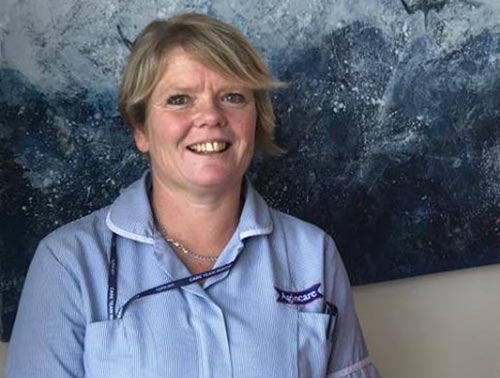(Published 26 June 2020)
On 23 June we were invited to share our social care sector experience at the Health and Social Care Select Committee.
As part of the committee’s ongoing national inquiry into social care workforce and funding, our CEO Raina Summerson and Weymouth home care worker Mel Cairnduff (pictured below) appeared as witnesses at the virtual meeting.

Other witnesses included Jane Townson, Chief Executive of the UK Homecare Association and four more representatives of the social care sector.
With more than 3,500 care team members Agincare is well-positioned to contribute to a national debate on social care. We have home care teams across the country, manage more than 20 care homes and provide live-in care for hundreds of people.
Led by former Health Secretary, Jeremy Hunt, the committee members were keen to hear Mel Cairnduff’s first-hand experience of working in home care, particularly during the coronavirus outbreak.
After expressing their thanks and appreciation for social care team members’ hard work and dedication, they were appalled to hear Mel explain how she did not feel valued by members of the public. She described how she had been ‘tutted at’ for wearing her uniform in public as she travelled between critical home care appointments.
However, asked whether she would recommend working in social care, Mel replied:
“I love doing what I do. You do it because you want to make somebody else happy, and make them have the best life that they possibly can.”
Raina Summerson expanded on why care workers deserved more recognition as key workers on the frontline. She explained that there was a distinct lack of understanding of home care, with care workers often classed by the government, public and media as unskilled.
However increasingly, and especially during the COVID-19 outbreak, home care workers were making critical judgements about clients’ care and carrying out tasks – such as medication and wound care – that would have previously been completed by health professionals.
Raina said this lack of understanding was generally compounded by a lack of trust and partnership in the system and from local authorities who bought home care services from care providers. Local authorities commission care on contact time only, with some continuing to pay for home care by the minute and most trying to get higher levels of critical care covered in shorter visits.
“In Covid the social care workforce has got on with it – they are resilient, they care and they are hugely skilled. If we go back to commissioning structures such as pay-by-minute, it’s just going to completely demoralise our home care workforce and make them feel that ‘You were useful for that period, but actually now we’ll go back to pushing you to the sidelines, not trusting you, not trusting your judgement, not trusting your time-keeping’. At the end of the day, that drives how our workforce feels.”
Raina felt that the inquiry is a positive step forward on the road to real social care reform:
“I really felt the committee listened to what we were all saying, and that our messages about the need for change came through strongly. Jeremy Hunt described the session as ‘shining a spotlight on an area that isn’t talked about nearly as much as it should be, where there are some profound issues that have come to light during coronavirus’.
“I look forward to reading the committee’s report, which should be published in the autumn. We all hope that their recommendations will feed into major policy changes and better long-term funding for social care.”
